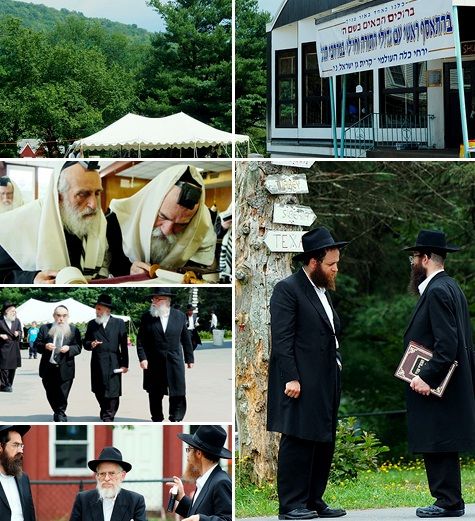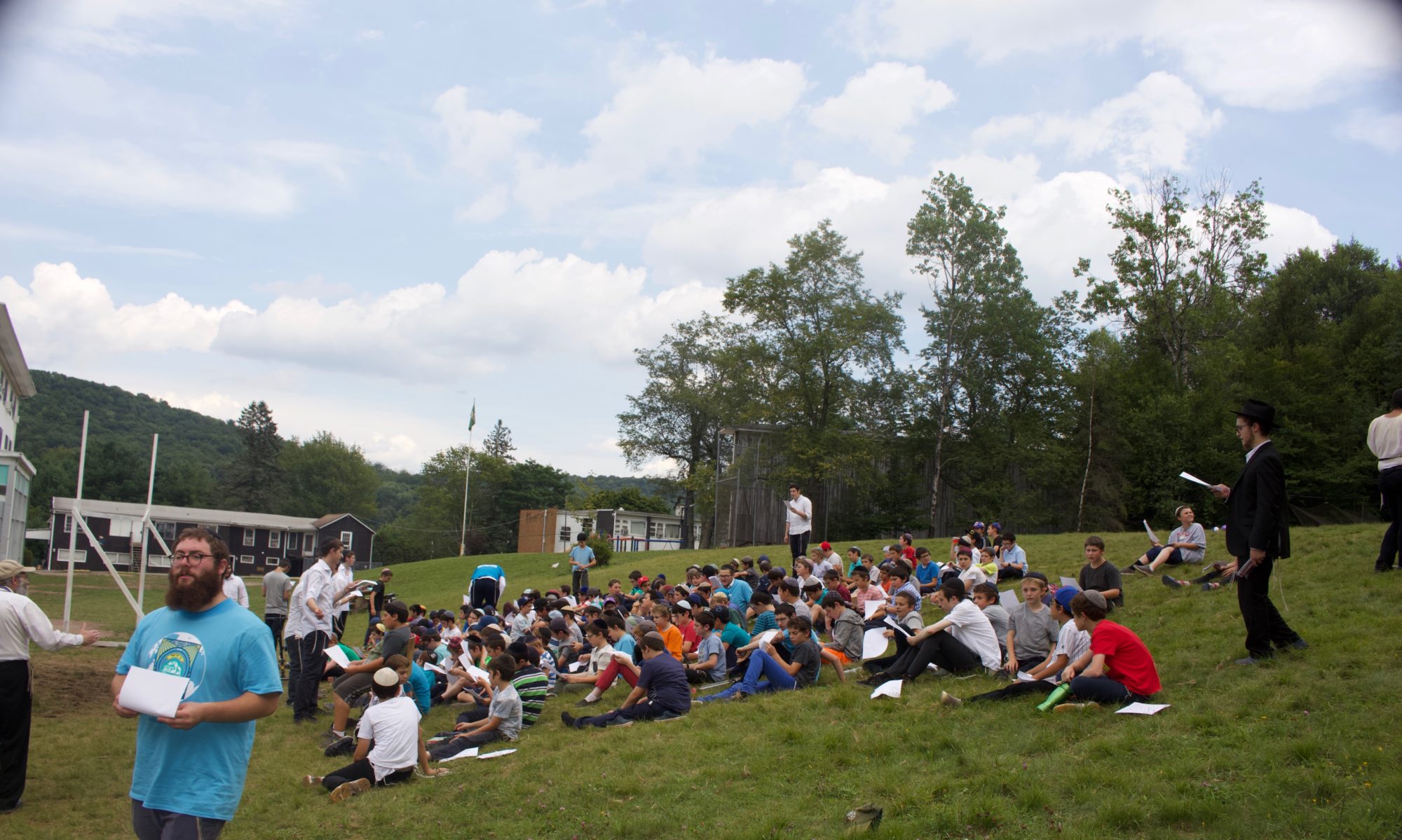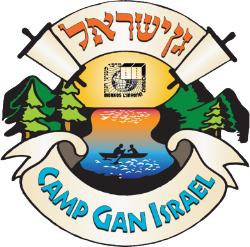
Rabbis and Torah scholars have been gathering in the Catskills every summer for the last 34 years. COLlive presents an exclusive overview of how “Yarchei Kallah” came about and who sponsors it.
By Rabbi Eli Touger
Photos by Baruch Ezagui
Anyone who witnessed the scene could not help but be overcome with a brimming sense of optimism for the future of Torah Jewry.
In the beautiful pastoral setting of Camp Gan Israel of Parksville, NY, amid hundreds of campers in their formative years, was held the 34th annual Yarchei Kallah, the largest, ongoing gathering of Torah scholars of this generation.
Young campers coming back from a baseball game gaze reverently as esteemed sages delivered learned addresses of Torah scholarship.
As they emerged from putting the finishing their arts and crafts projects, they watch as Rabbi Yechiel Kalmenson, the Rosh Yeshiva of Burnoy-France, concluded the resolution of a Talmudic difficulty.
Here – in fact, not merely in theory – was proof of the continuity of our Jewish heritage. The campers with their youthful enthusiasm and energy and the sages with their knowledge and rapt absorption in Torah study, functioned, not as two separate groups located on the same setting, but as rather one integrated whole.
A Throwback to an Earlier Era
The name Yarchei Kallah dates back to an institution established by Rav, the leading Sage in the Talmudic academy of Sura, in Babylonia, approximately 1800 years ago.
Rav was originally from Babylonia, but had studied for many years in Eretz Yisrael under the tutelage of the great Sage, Rav Yehudah HaNasi, the author of the Mishnah. When Rav returned to Babylonia, he saw a polarized community.
Yes, there were Torah scholars, but there were also a large proportion of the Jewish people who were very involved in earning their livelihoods and were therefore growing apart from the study of the Torah.
He ordained that for two months a year – the month between Purim and Pesach and during the month of Elul – the Jews gather together for collective Torah study.
There the average people and the venerated Sages would meet and immerse themselves together in the study of our timeless Torah heritage.
These convocations were called Yarchei Kallah. Yarchei is the plural of the Hebrew word for “month.” Kallah means “bride.” Thus the name means “the months of the bride.”
What is the source of this name? One of the explanations given is that the Giving of the Torah is referred to as the wedding between G-d and the Jewish people.
At the biannual convocations of Yarchei Kallah, the Divine presence was manifest in a pillar of fire just like at the time of the Giving of the Torah. And the bride, the Jewish people, was present in their myriads, as people from all walks of life took time off to participate in this endeavor to connect to our Torah roots.
Not Past History
Camp Gan Yisrael shares a unique bond with the Rebbe, as evidenced by the three visits he paid to it. With the exception of his visits to the resting place of his father-in-law, the Rebbe Rayatz, these were almost the only times the Rebbe left Crown Heights.
34 years ago, on the occasion of the 30th yahrzeit of the Rebbe’s father, the gaon and kabbalist, Rav Levi Yitzchak Schneerson, of blessed memory, consideration was given to highlight his contributions to our spiritual heritage and to honor him as the father pf the Rebbe, the foremost Jewish leader of our generation.
Our Sages emphasize that the greatest honor it is possible to pay to a person’s memory is to dedicate Torah study to his memory.
Spurred by that purpose, Rabbi Abraham Shemtov, head of Gan Israel who today chairs the umbrella Agudas Chassidei Chabad International, suggested to renew the age-old custom of Yarchei Kallah by gathering sages and scholars for a convention of study and inspiration overlapping the date of 20 Av, Rav Levi Yitzchak’s yahrzeit.
The plan was accepted and approved by the Rebbe and the Rebbe himself identified with this initiative. Once, in the midst of a farbengen held on the same Shabbos as Yarchei Kallah, he referred to the gathering and said: “This is my project.”
And when Rabbi Avraham Mordechai Hirschberg, the chief Rabbi of Mexico, told the Rebbe that he had participated in Yarchei Kallah, the Rebbe highlighted the connection to his father, explaining that the mitzvah of honoring one’s parents continues after their passing and that the most consummate honor that can be paid is the study of the Torah.
An International Dimension
Another one of the definitions of the term kallah is that it derives from the term כל, “all,” i.e., it is an assembly attended by the totality of the Jewish people. In microcosm, this characterizes the Yarchei Kallah of Gan Yisroel.
Not only scholars from the surrounding area, but also Torah leaders from Jewish communities all over the world join in this communal Torah enterprise. Of course, Eretz Yisrael is well represented, but also scholars from England, France, Russia, South Africa, South America regularly take time off from their own busy schedules to make the trip so that they could share Torah insights and learn from their colleagues.
The gather serves as a meeting of minds, an opportunity for the scholars – some of whom living far from the centers of Torah erudition – to bounce ideas of each other and sharpen their understanding through interaction with their peers.
Moreover, while the public sessions are dedicated solely to scholarship, in private, these leaders have an opportunity to discuss and develop a Torah perspective on contemporary issues facing the Jewish people as a whole.
Not Only for Scholars
Though the focus was on the Torah leaders who attended, they were not the sole participants. Aside from the campers who avidly watch and listened, many vacationers from the surrounding area attended and took part in the discussions. In that way, they connected this Yarchei Kallah gathering with the historic roots of the tradition.
Several of the Yarchei Kallah conventions have been immortalized by recording the addressed in print in the volumes entitled Mimeged Yerachim, edited by Rabbi Mendel Kaplan of Oak Park, Michigan.
This enables the positive impact of the experience to endure as the scholars would refer back to the text to sharpen their recollection of the teachings they had heard. Moreover, others who are unable to attend physically and even students in the future benefit from having these works of scholarship available.
The importance of these published work was underscored by the Rebbe who edited one of his scholarly treatises for inclusion in the first collection of the Yarchei Kallah studies in 5741 (1981). In the past, Torah giants and heads of yeshivos including Rabbi Moshe Feinstein OBM contributed to the publications.
This year, the sixth published edition of these works was printed, including the studies delivered at the Yarchei Kallah gather of 5769 (2009).
It includes works from Torah leaders like Rabbi Leibel Schapiro of Miami, Rabbi Eliyahu Landau of Kfar Chabad, Rabbi Dov Brisman of Philadelphia, and Rabbi Gavriel Zinner of Boro Park, among others.
Behind the Yarchei Kallah
Yarchei Kallah is sponsored by Mr. Ronald Perelman, a person whose efforts to preserve, perpetuate, and enhance our Jewish heritage led to the Lubavitcher Rebbe recognizing to him as “my partner.”
“Like a true partner, he has dedicated himself to advancing the Rebbe’s purposes, including the sponsorship of these Yarchei Kallah conventions,” Rabbi Shemtov notes.
The summit is coordinated by Rabbi Yehuda Ceitlin, a Chabad Shliach and Associate Rabbi of Congregation Young Israel of Tucson, AZ.
Helping with the organization are Mendy Ceitlin and Baruch Schneur Ceitlin of Montreal, Bentzi Avtzon of Hong Kong, Shmulik Goodman of Ashdod, Yisroel Neparstak of Kfar Chabad and the very dedicated staff of Gan Israel, directed by Rabbi Yossi Futerfas. The meals are catered by the camp’s chef Rabbi Shlomo Futerfas.


